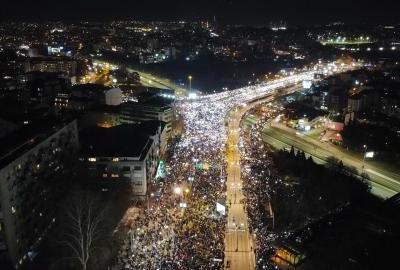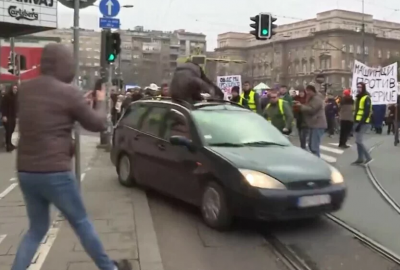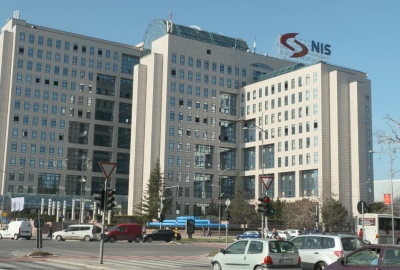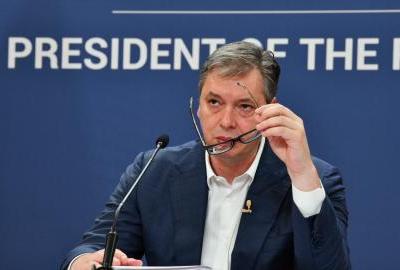Žurnal in English
A NIGHT THAT DOESN'T END: A memorial for a war criminal
Vinko Pandurević was the commander of the Zvornik Brigade within the Drina Corps of the Republika Srpska Army, and his brigade took part in the July 1995 attack on Srebrenica. The Hague tribunal's verdict states that Pandurević was convicted of "murder as a crime against humanity", "violation of the laws and customs of war", "inhumane acts, forcible transfer as a crime against humanity", and because ‘’he did not take the necessary and reasonable measures to prevent his subordinates from committing crimes"
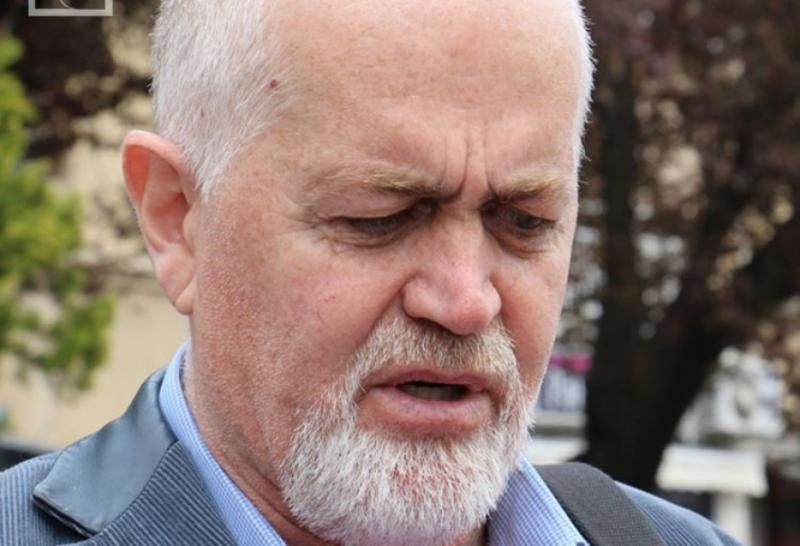
The Chief of the General Staff of the Serbian Army, Milan Mojsilović, organized a formal reception for the delegation of the Club of Generals and Admirals. On that festive occasion, Mojsilović awarded a military monument to retired General Vinko Pandurević for "participation in the defence against NATO aggression against the FRY". At least that's the official explanation. Unofficially, the pensioner received the memorial for some other merits that are not advisable to mention publicly, because he was sentenced to 13 years in prison before the Hague Tribunal.
Vinko Pandurević was the commander of the Zvornik Brigade within the Drina Corps of the Republika Srpska Army, and his brigade took part in the July 1995 attack on Srebrenica. The Hague tribunal's verdict states that Pandurević was convicted of "murder as a crime against humanity", "violation of the laws and customs of war", "inhumane acts, forcible transfer as a crime against humanity", and because ‘’he did not take the necessary and reasonable measures to prevent his subordinates from committing crimes’’. He was also convicted of handing over ten wounded Bosniaks from the Milići hospital to Vujadin Popović, the VRS Drina Corps security chief, knowing they would be executed. Members of the Pandurević Zvornik Brigade took part in the killing of civilians in Srebrenica, and they also helped transport corpses to mass graves.
Anti-Hague octopus
The awarding of the monument to Pandurević is no exception, but a continuation of the official state policy that glorifies and rehabilitates war criminals, declaring them exemplary citizens and pillars of Serbian society, so to speak, ideal figures that young generations should emulate. A few years ago, Marko Đurić - then director of the Office for Kosovo and Metohija, and today's Serbian ambassador in Washington - included Pandurević in something called "internal dialogue on Kosovo", so he talked about essential autonomy as a model for resolving the Kosovo issue, repeating Vojislav Koštunica's old failed formula.
Pandurević is a welcome guest on television with a national frequency, especially in Milomir Marić's "Ćirilica", where he participates in an electronic black mass together with other convicted or wanted war criminals, mocking the victims, denying any guilt and falsifying the criminal’s past. Like many of his colleagues after the murder, Pandurević also started to write, so he regularly publishes books, and Serbian institutions are holding their doors wide open for such editions. Thus, for example, Pandurevic's book "The Hague Octopus" was promoted in the Association of Journalists of Serbia.
This is just a drop in the Dead Sea, much more indicative is the case of Veselin Šljivančanin, a war criminal and member of the Main Board of the Serbian Progressive Party, who has been on a promotional tour for years, visiting libraries and cultural centres throughout Serbia. There, he preaches to the public about the world conspiracy against Serbs, about the innocence of mass murderers, about the fact that there were no crimes, but all this is being planted by foreign mercenaries. I don't know about the Hague one, but this anti-Hague octopus has let its tentacles into all the pores and institutions of Serbian society, you can't breathe from it.
A giant mosaic of dishonesty and cruelty
A few days after the ceremony at the General Staff, a video from a private ceremony in Priboj surfaced. The policeman was celebrating the birth of his son, so the drunken fellows rejoiced with appropriate songs that celebrate life, such as the famous vulture hit "Oh, Pazar, new Vukovar, oh, Sjenica, new Srebrenica". Children should be taught true values from a young age, from the cradle. It is just another black stone in a giant mosaic of dishonesty and cruelty. The mentioned song is a sound version of a famous work of art that can be seen throughout the imagined "Serbian world" - a mural with the character of Ratko Mladić, which adorns countless walls and public areas.
The most famous fresco of the mass murderer can be seen in Vračar, in Njegoševa Street, and is under state protection. Unlike activists, Aida Ćorović and Jelena Jaćimović, who were detained for shooting at the wall general with eggs, and Ćorović, meanwhile, was twice attacked by mural guards during the winter. With impunity, normally, and who would even chase the attackers when Aleksandar Vulin, a great admirer of the character and crimes of Ratko Mladić, is at the head of the police.
The genocide in Srebrenica is denied by all state officials, from the President of Serbia, Aleksandar Vučić, through the Prime Minister, Ana Brnabić, all the way to the smallest screw in the progressive machinery. The official policy of Serbia is that in Srebrenica, an unknown "terrible crime" took place, not genocide, and that it has nothing to do with us, as well as the previous year of war, mass extermination and persecution. Half of the opposition has such an attitude towards the criminal legacy, as well as some emerging young leaders such as Sava Manojlović from the "Kreni promeni" organization.
State-protected war criminals
"Quo vadis, Aida" by Jasmila Žbanić, which was declared the best European film, is not on the local cinema repertoire. Serbian actress Jasna Đuričić, who won the European Oscar for her role as Aida, is exposed to strong insults and defamation. For years, the fans have been chanting "Knife, wire, Srebrenica" in the stands, none of them were held accountable. Serbian institutions are not only stopping to glorify convicted criminals, but they are also actively defending those who have yet to be brought to justice.
At least a dozen people indicted for war crimes in BiH are hiding in Serbia, and state authorities refuse to extradite them, despite co-operation agreements. Anyone who took part in massacres and persecutions of non-Serbs can count on Serbian citizenship under a shortened procedure and state protection. There are also those who have already been convicted, but can never be sent to serve their prison sentences, because the competent institutions are extremely accommodating to cold-blooded slaughterers, provided that they killed women and children for "our cause". Such is the case of Novak Đukić, who was sentenced in Bosnia to 20 years in prison for the massacre at the Tuzla Gate, but has no intention of sending him behind bars.
Politics forgets
When we add strong Nazi intellectuals who diligently falsify the past and the media army that delivers an unbearable amount of forgery, chauvinistic hatred and pure, unadulterated evil every day - we get a somewhat true picture of today's Serbian society. Although only one detail of that bloodthirsty picture is listed, it is a composition of giant format, with thousands of protagonists and countless acts of barbarism, it takes at least two lives to make a complete catalogue, under the optimistic assumption that it is feasible.
Perhaps only the general indifference of the public is more terrible than the raging, institutionalized evil. Organizations that react in such cases, the Youth Initiative for Human Rights and the Humanitarian Law Center, journalists dealing with criminal heritage, activists and individuals from whom a reaction is expected reacted to the monument to Pandurević. There were a few more reactions to the genocidal festivities in Priboj, opposition politicians also spoke out, and even Vučić muttered something, although his statements were pure hypocrisy - at best, he would punish a petty rioter, and at the same time continue with state honours to mass murderers and with a policy of forgetting and pushing the past under the rug.
However, Vučić's behaviour is logical. Since he spent the 1990s as an active participant in criminal policy and made a career on corpses, in his case, a fair confrontation with the past would mean leaving politics, voluntary self-lustration, and probably reporting to the competent prosecuting authorities. It is similar to his comrades from that dark time, such as Aleksandar Vulin, Ivica Dačić, and all those younger people who embraced the ideology of blood and soil.
On a night that never stops
The behaviour of those who did not take part in any evil, but willingly join the criminal legacy, deny genocide and the Hague verdicts, perceive Milošević's propaganda platitudes as a realistic picture of things and persistently refuse to face the truth. Or they are angry that someone reminds them of the past, of those antiquities, long-forgotten events that have nothing to do with them, because they happened when they were children or they were not born at all. Or they claim that war crimes issues are being sought to "divert attention from important things" and invent similar unscrupulous excuses. As if there are more important things than human life. What to say to people who voluntarily come in defence of criminals, several decades after the crimes were committed? What language to speak where the ability to distinguish between good and evil is lost?
It is difficult to write about all this, even when stating naked facts, a person has the impression that he is betraying the truth, because he cannot reach the scale of the anthropological catastrophe in which he lives. When he visited Sarajevo after the war in 1997, Radomir Konstantinovic spoke of a similar feeling, as after every word he said, "he felt bad, very bad: as if I had hidden something with my speech." He also said that "a man who, under the triumph of evil, does not want to replace words with the roar of a beast, wounded to death, is not a man." And that this beast is actually "the animal of my humanity, the great wonderful terrible animal of despair" which asks man to roar. "There is no humanity today of despair. There is no speech today without his deep temptation with sobs and howls ", said the wise Radomir.
Our situation has not changed much since that time, maybe it is even worse, more inhuman, and evil even more triumphant. We are still "in a night that never stops", in which war criminals receive memorials, law enforcement officers sing anti-songs that call for new massacres, and numbness and indifference cover millions, like a black veil. And yet, in spite of pitch darkness and general deafness, we must speak, even if clumsily, insufficiently, sloppily, everything is better than muffled silence. I have to "articulate crying, to humanize the animal of wounded humanity." As long as the conspiracy of silence about the evil committed rules, the order of speech remains the only ethical imperative.
(zurnal.info)





